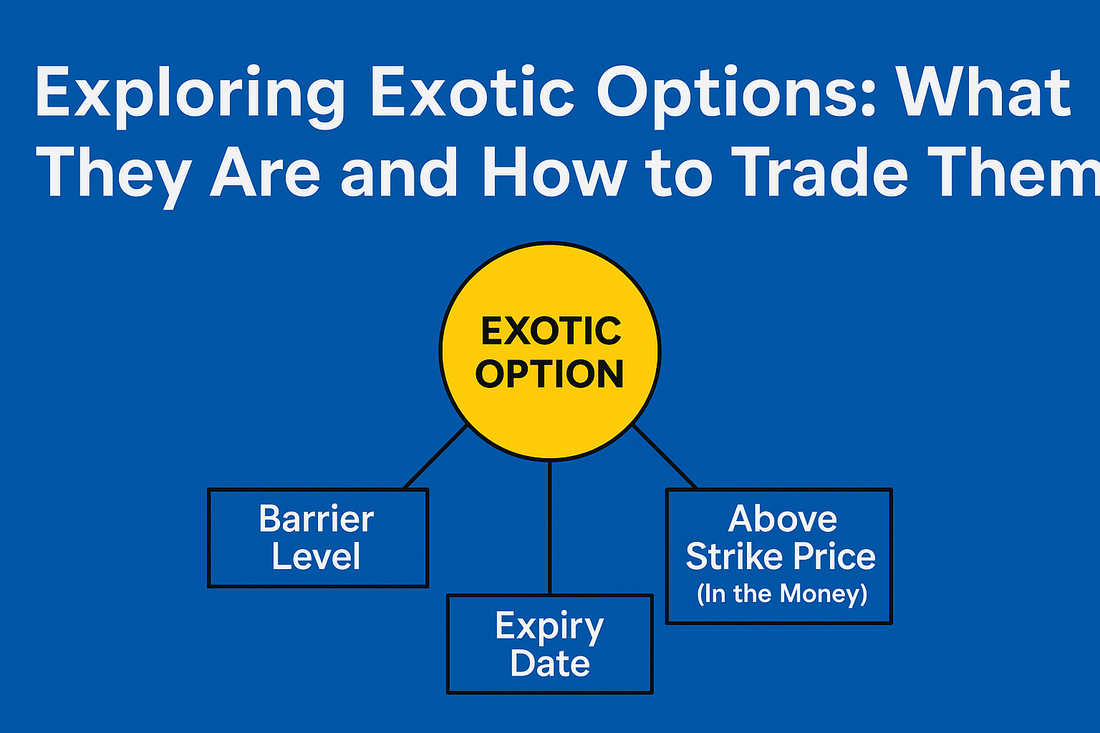
Exploring Exotic Options: What They Are and How to Trade Them
Introduction
In the world of options trading, most investors are familiar with vanilla options — the standard American or European calls and puts that dominate exchanges. But beyond these lies a lesser-known yet powerful family of instruments known as exotic options. While these contracts are more complex and less liquid, they provide strategic opportunities for sophisticated traders seeking unique payoffs, custom risk profiles, or exposure to nuanced market behaviors.
This article serves as an in-depth guide to exotic options — what they are, how they differ from traditional options, which types exist, and how to trade them responsibly. Whether you’re a curious retail trader or an aspiring quant, understanding exotic options opens new dimensions of possibility in derivatives trading.
Section 1: Types of Exotic Options
1.1 What Makes an Option “Exotic”?
Exotic options are derivatives that differ from standard calls and puts in at least one major way:
- Payoff structure
- Trigger conditions
- Observation periods
- Settlement style
- Path-dependency
They are often custom over-the-counter (OTC) contracts but are increasingly available on digital platforms and brokerages, especially in the crypto space.
📌 Backlink Opportunity: Binary Options vs. Traditional Options
1.2 Popular Types of Exotic Options
A. Barrier Options
These are path-dependent options that are activated or deactivated once the underlying asset hits a certain price.
- Knock-In: Only becomes active after price breaches a barrier.
- Knock-Out: Gets canceled if price breaches a barrier.
Example: Buy a call that knocks in only if SPY rises above $450.
B. Binary (Digital) Options
These pay a fixed payout if a condition is met, or nothing otherwise.
- All-or-nothing payoff
- Common in short-term forex and crypto markets
Example: Earn $100 if EUR/USD closes above 1.1000 by expiration.
C. Asian Options
The payoff depends on the average price of the underlying over a period of time.
- Reduces volatility risk
- Useful for commodities and FX
Example: Call option payoff based on average BTC price over 30 days.
D. Lookback Options
Allows the trader to “look back” at the best or worst price of the asset during the contract term to determine the payoff.
- Removes timing risk
- Premiums are high due to favorable payout terms
E. Chooser Options
The trader can choose, at a predefined date, whether the contract will be a call or a put.
- Great in uncertain markets
- Offers ultimate flexibility at a cost
Section 2: Strategies for Trading Exotic Options
2.1 Barrier Option Strategies
Knock-In Options are ideal for traders who expect a breakout but want to reduce premium costs. Since the option activates only if the move occurs, they’re often cheaper than standard options.
Knock-Out Options allow a cheaper entry but come with the risk of premature termination. Great for range-bound conditions.
📌 Backlink Opportunity: Options Trading in Volatile Markets
Strategy Example:
- Use knock-in puts to hedge a long position only if a critical support breaks.
- Use knock-out calls to profit from upside, but save cost if the asset fails to rally.
2.2 Binary Option Trading Strategy
Binary options are commonly used for short-term speculation. Since the payoff is fixed, traders often stack small positions across multiple strikes or expiries.
Strategy Example:
- Bullish on BTC at $40,000? Buy binary options at 3 nearby strikes (39,500, 40,000, 40,500).
- If BTC spikes above all levels, multiple binary positions payout.
Caution: High risk of total loss if the market doesn't move favorably.
📌 Backlink Opportunity: Speculative Strategies with Options
2.3 Asian Option Strategy
These are excellent for reducing exposure to price manipulation or event-driven volatility.
Strategy Example:
- Use Asian call options on commodities like oil or crypto where end-of-month squeezes are common.
- The averaging mechanism provides a fairer settlement price.
Also used by institutions to hedge large trades that would otherwise be impacted by slippage.
2.4 Lookback Option Strategy
Lookbacks are among the most favorable to the buyer, since you can choose the best price during the term. These are often used for:
- Hedging long-term corporate positions
- Pricing employee stock options
Strategy Example:
- Buy a lookback call on QQQ during periods of high volatility and price swings.
- Eliminates concern about timing entries perfectly.
2.5 Chooser Option Strategy
These are useful when you expect a strong move, but are unsure of direction.
Strategy Example:
- If TSLA earnings are upcoming, but you’re unsure if they’ll beat or miss estimates, buy a chooser option expiring after earnings.
- Decide whether to choose a call or put based on market reaction.
📌 Backlink Opportunity: Trade Earnings Volatility with Options
Section 3: Risks Involved with Exotic Options
3.1 Complexity and Understanding
Exotic options involve non-linear payoffs and often depend on path, not just final price.
- Traders must understand trigger conditions and settlement rules.
- Some options may expire worthless even if the final price is favorable.
3.2 Liquidity and Execution Risk
Most exotic options are traded OTC or via specialist brokers.
- Lower liquidity = wider spreads
- Harder to exit early
- Mark-to-market pricing may be opaque
📌 Backlink Opportunity: Navigating Risk Management in Options
3.3 Higher Premiums for Favorable Terms
Lookbacks and choosers carry higher premiums due to the favorable payout mechanics.
- Always compare premium cost vs. potential gain
- Use expected value calculations to assess attractiveness
3.4 Counterparty Risk (in OTC Markets)
Many exotic options are OTC derivatives, exposing you to counterparty risk. Ensure:
- You trade with regulated brokers
- Contracts are clearly defined
- Settlement processes are documented
3.5 Regulatory Environment
Binary options are banned or heavily restricted in many jurisdictions due to misuse and fraud.
Always check local laws and broker credentials.
📌 Backlink Opportunity: Understand Regulatory Changes in Options Trading
Section 4: Real-World Examples
Example 1: Knock-In Put for Portfolio Hedge
Investor wants to hedge a $500,000 tech portfolio only if SPX falls below 4,200.
Trade: Buy a knock-in SPX put with a barrier at 4,200 and strike at 4,000.
- Cost: Lower than regular SPX put
- Hedge only activates when needed
Example 2: Binary Options in Forex
Trader bets that EUR/USD will close above 1.1000 at Friday’s close.
Trade: Buy binary call for $45 with $100 payout.
- If EUR/USD closes at 1.1010 → earn $100
- If EUR/USD closes at 1.0990 → lose $45
Outcome: Clear, binary risk/reward setup
Example 3: Asian Option in Commodity Trading
A trading desk needs to hedge exposure to wheat but fears price manipulation near expiry.
Trade: Buy an Asian call with 30-day averaging on wheat futures.
- Smooths price movement
- Reflects truer market dynamics
Section 5: Diagram – Understanding Exotic Options

📌 Backlink Opportunity: Advanced Tools and Techniques for Options Analysis
Section 6: Who Should Use Exotic Options?
✅ Suitable for:
- Experienced options traders
- Institutional hedgers
- Quants and algo strategists
- Crypto traders using binary/knockout products
❌ Not ideal for:
- Beginners without strong derivatives knowledge
- Traders looking for high liquidity
- Short-term retail investors without proper education
Final Thoughts
Exotic options may sound intimidating, but for the informed trader, they offer an edge — custom-built structures for hedging, speculation, and yield generation. These products can fine-tune your exposure in ways standard options cannot.
But with complexity comes responsibility. Mastering exotic options requires education, disciplined strategy, and a deep understanding of the risks involved.
Want to Master Exotic Options with Expert Guidance?
At www.optionstranglers.com.sg we offer:
• In-depth live 1-1 sessions / group classes
• Trade examples and breakdowns
• Community mentorship and support
👉 Ready to upgrade your strategy and trade like a pro? Visit www.optionstranglers.com.sg and start your journey to financial freedom today.
Your future is an option. Choose wisely.
⚠️ Disclaimer:
Options involve risk and are not suitable for all investors. Always consult with a financial advisor before investing.
